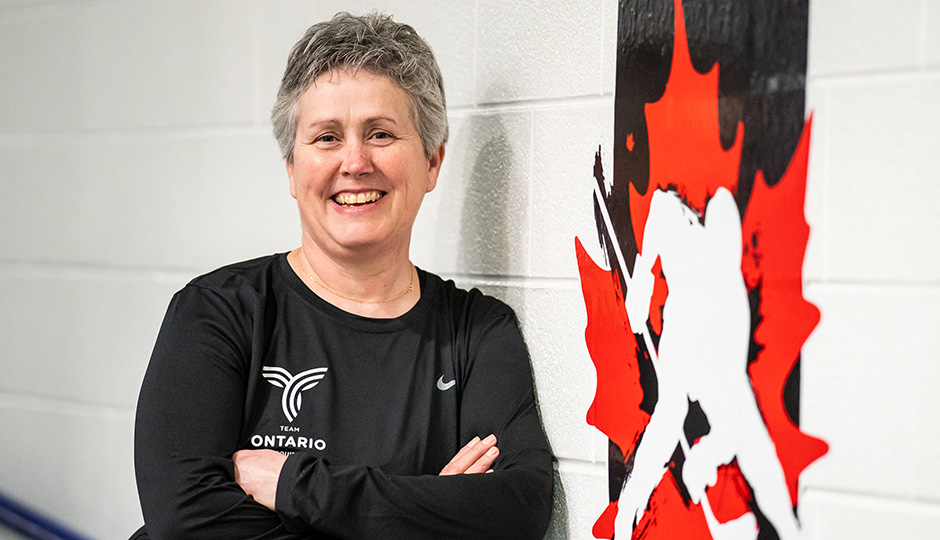More than three decades after winning gold at the first-ever IIHF Women’s World Championship, Teresa Hutchinson is giving back as a volunteer in Brampton
Teresa Hutchinson will never forget the moment she won a gold medal with Canada’s National Women’s Team at the 1990 IIHF World Women’s Championship.
“It’s always special when you get to compete for your country,” Hutchinson says. “You know, doing it at the first World Championship was obviously a great honour.”
Thirty-three years later, Hutchinson finds herself back at Women’s Worlds, this time as a volunteer in Brampton.
“I like to be busy. I like to do things that have meaning and have purpose and being able to volunteer and give back to something in a game that’s given me so much, it’s just something that I wanted to do,” she says.
A product of Thornhill, Ont., Hutchinson played for a senior women’s team in nearby Newtonbrook as a teenager and eventually found herself playing defence for a high-level Senior A hockey team in Mississauga. By 1990, she was so good that she wound up making Team Canada for the inaugural Women’s Worlds in Ottawa.
A few years after winning gold, Hutchinson turned her attention to coaching. She has since coached at just about every level, including provincial U16, U18 and Canada Games teams, winning titles along the way.
“For the love of the game and a different perspective,” Hutchinson says about her desire to begin and remain in coaching, “Hockey has given me the opportunity to give back and help the next generation, learn and more importantly, love the game and become better people.”
In 2020, Hutchinson, who has been an assistant coach with the women’s hockey team at York University for five seasons, was named BFL Female Coach of the Year (High Performance) for her outstanding resume and continuous commitment to the game.
“Obviously, it’s a great honour,” she says. “I found out as I got into coaching … that there’s so much more to coaching than a lot of people know, the long hours that you put in, so it’s nice to be recognized and acknowledged for that and the contributions that I’ve made for the game over the past numerous years.”
Changes for the better
Thirty-plus years ago, fan support for women’s hockey in Canada at a national level was there, even if corporate sponsorship dollars weren’t.
Hutchinson saw that firsthand during a pre-tournament game against West Germany held outside of Ottawa ahead of the 1990 worlds.
“It was just a small barn with two or three benches that had seating around it and it was full, and literally fans were hanging over the boards,” recalls Hutchinson. “There was body-checking back then and I got rocked by a German player right at the blue line. I was scared because I thought the fans were gonna come over the glass at the German player.”
Since then, stars like Angela James, Jayna Hefford, Hayley Wickenheiser and Cassie Campbell have come and gone, increasing the sport’s popularity and paving the way for today’s stars like Marie-Philip Poulin, Sarah Nurse and Natalie Spooner.
“I’ve watched almost all of the games and all of the tournaments and just to see how it’s advanced, not just in the play on the ice, but also the support that the players are getting from their federations and they’re getting from the fans. It’s amazing,” says Hutchinson. “To see the little kids, boys and girls, coming up looking for autographs and just being starstruck when they see the players, it’s so special. It’s special to see the players of today getting the recognition.”
Another difference is that there are far more opportunities for women to continue a career in hockey after their playing days are over — something that wasn’t necessarily available in the early 1990s for women like Hutchinson, who has had a 30-year career in law enforcement along with her coaching career.
“Women can make a career out of hockey,” says Hutchinson. “There is the athletics side, but they can also get into the television or management and that is an amazing thing.”
Room to grow
As a volunteer lead in Brampton, Hutchinson is responsible for overseeing the hundreds of other volunteers at the Women’s Worlds.
One of the reasons for so many volunteers is the number of Hockey Canada-organized community events such as public skating, ball hockey, Esso Fun Days, Try Hockey, coaching and officiating clinics.
“It is really trying to expose people that don’t have that much exposure to hockey to the game. The good thing is that most of the participants that come in for any of the clinics and that are getting tickets to one of the games. So, again, just to help grow that exposure to hockey,” Hutchinson says. “We’ve had a couple of volunteers that maybe aren’t as familiar with hockey and, you know, they’ve had the opportunity to watch some of the games so hopefully that gets them hooked.”
While there is still work that needs to be done to grow women’s hockey, Hutchinson says having the Women’s Worlds in a culturally rich and ethnically diverse community such as Brampton is an important step forward.
“Something that hockey generally has lacked is the diversity of the visible minority. Just like anything in life, we should represent the community that we live in. The fact that it’s here, I think it’s really exposing it to newer Canadians or maybe Canadians that haven’t had hockey as one of their primary sports or entertainment and that is really important,” she says.
With files from Paul Edmonds



